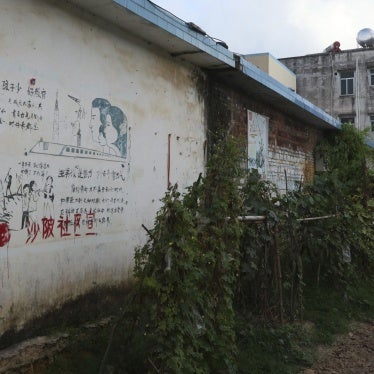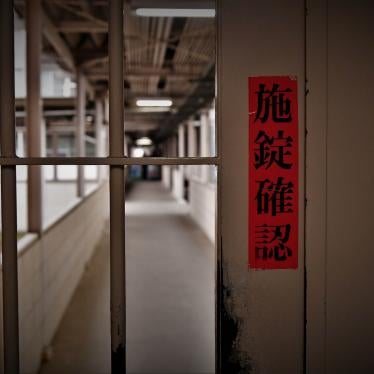Nineteen-year-old "Rana" had been in Kabul's women's prison for 4 1/2 months when I met her. She was charged with the "crime" of "running away with a boy," a common allegation levied against girls and women in Afghanistan's prisons.
After being married at age 15 to a man who beat her, Rana fled to another man's home, lived with him and bore a child. She later contacted her family, but her uncle decided to kill her for her infidelity. To protect her, Rana's mother turned her in to the police. Holding her 18-month-old baby, Rana told me she is afraid her family will kill her if she is released. In prison, she said, "I am safe."
No, this is not a story of women living under the Taliban, the most misogynistic regime the modern world has known. This is the reality that women and girls face today in post-Taliban Afghanistan.
The common perception outside Afghanistan is that when the U.S.-led forces overthrew the Taliban, women and girls were liberated. The truth is somewhat different. Despite improvements in access to education and an end to the Taliban's ban on working outside the home, an array of Taliban-era restrictions on women remains in place. One of the worst places is the western province of Herat, ruled by local warlord Ismail Khan.
For Herati women and girls, every decision, every day presents dangers or challenges from the government: where they can go, how they can get there, whom they can go with and how they can dress. Herat police now arrest women and girls found alone with men to whom they are not related -- even when walking in the street or riding alone with a taxi driver. The police then take them to the hospital for forced medical examinations to determine whether they have recently had sexual intercourse.
Women in Herat still wear the all-enveloping burqa or chador. Government officials enforce this dress code by harassing women and girls on the street, at school and university, and at work.
Freedom to work also is threatened. Ismail Khan has publicly chastised women for working for international organizations and imposed burdensome conditions on them. Officials of the United Nations and other international organizations say this makes it more difficult to administer aid programs to women.
Many girls are back in school but must study separately from boys, even at Herat University. The few women studying law, journalism and engineering despair of being allowed to practice these professions. "Only the doors to the schools are open. Everything else is restricted," a 21-year-old Herati woman told me.
Things are getting worse, not better. The few women and girls who have dared to challenge Khan's policies have been harshly intimidated. At a public meeting in Herat, one woman tried to read an article she had written stating that women have the same human rights as men, but government officials castigated her. She was badly shaken by the experience. Still in the ninth grade, trying to make up for time lost under the Taliban, she has all but lost hope: "I think it is too late for me. The government will change but not in time for me."
Conditions in the capital of Kabul are better, but resurgent Taliban-era restrictions are starting to sprout up even there. Government employees of a renamed "Vice and Virtue" office have patrolled Kabul's streets in recent months to harass women wearing makeup and "calling attention to themselves." Elsewhere, a girls' school in Sar-e Pol was recently burned down by a group formerly allied with the Taliban that now holds power in several districts. In Zabul province, troops have threatened men who allow their wives to teach or their daughters to attend school.
Aid officials understand the problems, but not enough is being done to address them. Many U.N. and development agencies too readily accept culturally relative arguments about women and girls, somehow giving higher priority to tradition than rights. Some suggest that pushing too aggressively on women's rights in Afghanistan would be destabilizing and would cause a backlash. But no one is suggesting forcing women and girls to adopt norms they don't want. What is necessary is to allow women and girls in Afghanistan to make choices for themselves.
More than a year after the Taliban's fall, it is time for the United States, United Nations and others to follow through on their rhetoric of change and freedom. More aid and technical assistance must be provided to Afghan women and girls who are working to articulate, demand and obtain their basic human rights, not just in Kabul but in the provinces as well.
A first step is to make the protection of human rights a larger part of the U.N. mandate in Afghanistan. In addition, the Afghan government must protect those rights by changing the law: On the same day the government released 20 women in Kabul jailed for "moral crimes," Kabul's police chief vowed to keep arresting them.
The outside world must lend material and moral support to Afghanistan's women so they can stand up to the male-dominated warlord culture all around them. So long as women continue to see prison as a better alternative to their lives in Afghanistan, the rest of the world should know it has failed.
Zama Coursen-Neff is Counsel to the Children's Rights Division of Human Rights Watch.








